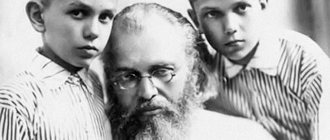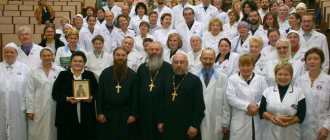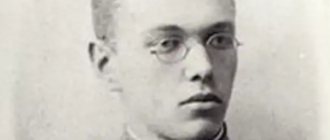Nowadays medicine has developed very well. Operations have become quite simple and commonplace. But in any case, the upcoming test worries and burdens not only the patient, but also the doctor. Such worries deprive you of sleep and appetite.
(Sir.38)
“Honor the doctor according to the need for him, for the Lord created him, and healing comes from the Most High, and he receives a gift from the king...”
But, despite everything, the doctor’s hands are controlled by the Lord himself. And God wants a person to always learn not to hope for anything, but to resort to His help and the intercession of the holy saints.
The doctor's hands are controlled by the Lord himself. And God wants a person to always learn not to hope for anything, but to resort to His help
Saint Luke - taught all his workers to pray to God before the operation
Before the operation, Saint Luke asked the patient whether he believed in God, because it was not man, but God who would bring him back to life through the hand of a doctor. In the operating room, Saint Luke had an icon, and next to it a lit lamp. Then he put a cross on the body of the sick person with iodine.
Saint Luke Voino-Yasenetsky taught his workers to pray to God before the operation
Many remember that the saint taught all his workers to turn to God in prayer before an operation.
A believing doctor prays not only before the operation, but also after it, for the healing of a sick person. Doctors should say these prayers with a pure heart, believing in the best outcome of the patient’s events. A doctor should confess and receive communion about his medical sins as often as possible.
Add a name for commemoration:
If you want to enter the name of a health worker or volunteer you know who works in direct contact with people infected with coronavirus, enter his name (without surname), city and place of work in our special form.
The prayer is intended for private (home) reading, so people of any religion can be commemorated. However, if someone decides and is able to remember these people in church during the liturgy, we will separately note in the list of those whom we know for sure that they were baptized into Orthodoxy.
Please tell your friends about this project, invite everyone who is ready to participate in it to prayer. Together we are the Church, remember: our petition is very valuable before God.
“Praying for Doctors” is a project created on the initiative of the magazine “Thomas” with the support of the Synodal Department for Charity and the Synodal Department for Relations of the Church with Society and the Media.
There is a prayer that a doctor should read before starting the working day
There is a prayer of an Orthodox doctor. What is this? This is a prayer that is read by doctors before starting their working day. It needs to be read every day.
Before starting his work, the doctor reads a special prayer
Doctor's prayer:
Lord bless my coming day. Bless me with love and patience to receive all the sick who come to me. Don’t let us forget that they were all sent by You. Enlighten and enlighten me, help me correctly diagnose and treat my sick, everyone whom You entrust into my hands. Instruct and enlighten me in everything. Give me the spirit of selflessness, kindness, mercy and compassion for my sick. Remember them in physical and mental sorrow and grant them patience in illness, healing of soul and body, and repentance for their sins.
May the cross of illness serve them for salvation. Give me a peaceful spirit with my colleagues and co-workers. Through my service may Your Holy Name, the Father and the Son and the Holy Spirit, be glorified. Thank You for everything. Amen.
^ Medical sins
Medical sins can be divided into several groups. The first group: sins of ignorance - when, due to insufficient competence or lack of training, we bring suffering to patients that would not have occurred if the level of professional skill had been higher. Overcoming this group of sins is by constantly working on yourself, on your professional level, on your laziness and negligence in your specialty. A doctor must study throughout his life. Everything changes: drugs, equipment, situations. A doctor is not a machine, not a mechanism. This is a person who practically lives his life with patients, taking into account and analyzing all the factors of what is happening around him and adapting them to the situation. The second group: sins of weakness - when, due to fatigue, or a bad mood, or absent-mindedness, or inattention, or the soreness of our bodily nature, we miss or do not notice the symptoms of the disease and make the diagnosis incorrectly or late. The sin of weakness is often associated with pride. We don’t want to admit to ourselves that this error in diagnosis or intervention is due to the fact that we were out of shape today. But you have to say: “Yes, I operated poorly today, yes, I hurt the patient and unsuccessfully punctured or palpated the patient, forgive me, Lord.” We often forget that all this is a matter of repentance. Surgeon V. A. Sukhodolskoy recalls: “Valentin Feliksovich was heartbroken for each of his failures... When, entering the ward, he noticed that the patient whom he had operated on two days ago was not there, he, without asking anything, went up to the second floor and locked himself in his room” 1 for prayer. This group of sins is overcome by humbly turning to God. An example of such treatment in a state of weakness and fatigue was left to us by St. right John of Kronstadt: “Lord, Your name is Strength! Strengthen me, who is weak and falling!” Help me not to make mistakes in diagnosis and treatment. The third group: sins of love of money - when we felt a movement of the heart in ourselves, in which the prevailing desire was to extract personal financial or human gain from a sick person, and not to serve the sick Christ. We must accept each patient as a messenger of God, as a blessing from God, and ask in our hearts: “Lord, how can I help this person, what do you expect from me in relation to him?” Do we always do this? Do we always pray for our patients? After all, as doctors, we are called to this by God. Do we always say: “Lord, have mercy on my sick man, whom You have entrusted to me”? “Have mercy on all whom I treat and have treated.” “Vladyka Luke treated the sick for the sake of God, and also, for the glory of God, he often helped the needy and consoled the unfortunate. His private appointments and consultations were free. Vladyka Luka considered his scientific activity, the publication of books and articles, and the receipt of the State Prize as a means to raise the authority of the Church. There is no doubt that in those terrible times, the open preaching about Christ of the famous scientist, the famous surgeon could not help but make many, many people think.” 2 The sin of the doctor’s love of money is overcome by completely surrendering oneself into the hands of God, by trusting in good Providence: “The Lord gives as much as is needed, when needed and through whom it is needed. He will not leave me without bread. I will heal in Your name, but You Yourself will take care of me.” A money-loving doctor will never succeed spiritually because he hinders God's mercy. Materially he will be very rich, but spiritually poor. As Elder Paisiy Svyatogorets says, “in order to succeed, a lot of trust in God is required.” The fourth group: sins of self-confidence - when our rational knowledge and confidence: “I can do everything,” obscures Christ. Medical uncertainty is a bad thing, but self-confidence is also bad. “I can do everything through Jesus Christ who strengthens me,” this is the correct inner dispensation of the Orthodox doctor. Do we always thank the Lord for giving us the opportunity to serve Him, for sparing the sick and helping us with treatment? A believing doctor can overcome the sin of medical self-confidence with beneficial self-abasement: “Without You, Lord, I cannot do anything.” The fifth group of sins is associated with violation of well-known rules of ethics and deontology. This is already the Christian life itself and the Christian feat - to keep the commandments of God where no one wants to keep them. Therefore, adherence to the found principles of medical ethics is synergistic with the doctor’s desire for Christian life in the world. In conclusion, I would like to note that a doctor who claims to be Orthodox must be clearly aware that this is not a sign or name of his religious identification, but a special way of serving God and saving his soul. I remember the spiritual testament of St. Reverend Confessor Sergius of Srebryansky, confessor of the Martha and Mary Convent, applicable not only to sisters of mercy, but also to Orthodox doctors: “Always remember the purpose for which you undertook this work. This goal is to show Christ to the present society as the first Christians showed Him to the ancient pagan society.” Therefore, the appearance of Christ to colleagues and patients is the essence of the appearance of an Orthodox doctor and the core of his ministry in the modern neo-pagan world.
[1] Saint Luke of Crimea (Voino-Yas Enets). Autobiography. I fell in love with suffering. The coming of the Holy Spirit. M. - 2007., pp. 178–179. [2] Saint Luke of Crimea (Voino-Yas Enets). Autobiography. I fell in love with suffering. The coming of the Holy Spirit. M. - 2007., S. 130.
Please note that the information presented on the site is for informational and educational purposes only and is not intended for self-diagnosis and self-medication. The selection and prescription of medications, treatment methods, as well as monitoring their use can only be carried out by the attending physician. Be sure to consult a specialist.
The Orthodox doctor also reads a prayer for the healing of a sick and mentally ill person
Prayers for the healing of a sick person can be read when the patient is in intensive care.
Prayer for the healing of the sick:
Oh, Most Merciful God, Father, Son and Holy Soul, worshiped and glorified in the Undivided Trinity, look with compassion on Your servant (name), who is overcome by illness; forgive him all his sins; give him healing from his illness; restore his health and bodily strength; Give him a long and prosperous life, Your peaceful and premium blessings, so that together with us he brings grateful prayers to You, the All-Bountiful God and my Creator.
The Orthodox doctor also reads a prayer for a mentally ill person.
Prayer for mental and physical illnesses:
Father, shelter for the orphans, and for the troubled, and for the sick, for the Physician, bear our infirmities painlessly, and accept our ailments, O Most Blessed King Himself, and Savior Christ Jesus, accept the prayer of us unworthy: just as you accepted the prayer of the Canaanite wife for her ailing daughter: and as in the days During Your earthly life You healed all sorts of mental and physical ailments: now and now, Most Gracious Master, I pray to You, heal Your servant (name), for He is good and a lover of mankind.
After treatment, patients strive to thank their doctors
As we see, the essence of all prayers is that the doctor asks not for himself, but for the Lord to send his Divine grace to heal the sick person.
An Orthodox doctor prays not only for healing or help in a person’s bodily infirmity, but also for the healing of the whole person, or rather his soul and body, even when the person is dying.
Will the patient thank him for such efforts? Grateful patients always try to thank their doctors. Bishop Luke, in response to the gratitude of his patients, always said that it was God who healed them with his hands. And he always told them to pray and thank God.
After healing from an illness, you must first thank not only the doctor who helped you, but God. Because it was God who, through the hands of a doctor, was able to heal you.
Saint Basil the Great expressed his opinion on this matter. He taught that
“...it would be bestial nonsense to hope to get health only from the hands of a doctor, which, as we see, is subjected to by other pathetic people who are not ashamed to call doctors their saviors...”
Saint Basil the Great said that it is wrong to believe that a doctor heals people from illness, only God heals us through the hands of doctors
^ Types of doctors in relation to God
Currently, several types of doctors’ attitudes toward God can be distinguished. Type I: atheist doctor. A doctor brought up on a materialistic basis and the belief that God does not exist. There are about 30% of such doctors in Russian medicine. Type II: non-Christian doctor. A doctor who believes in God, but does not confess the Holy Trinity and Jesus Christ as the Son of God. These are Muslims, Buddhists, Jews. Type III: doctor-non-Orthodox Christian. These are doctors who adhere to Catholic, Lutheran and other non-Orthodox faiths. Type IV: a doctor who recognizes Orthodoxy. This is a doctor - baptized in Orthodoxy, respectful of the Church and its Sacraments, but not living a church life, and not observing the rules of the Church's rules. Those. This is a little or unchurched person. There are a majority of such doctors in Russian medical institutions. About 80% of doctors consider themselves Orthodox, although in fact they are not. Type V: occultist doctor. A doctor who understands God in misconceptions of a mystical nature, considering Him to be simply mind, a force endowed with energy, something (namely, not someone), but something from above. Such a doctor treats God as a kind of energy that can be usefully used for his medical treatment purposes. Type VI: doctor professing Orthodoxy. Who is this? What is his portrait? What makes it different from other types?
Abba Dorotheos said, no one receives healing without God
Also the Monk Abba Dorotheos said,
“...when reading medical books or asking someone about them, do not forget that without God no one receives healing. So, whoever devotes himself to the art of medicine must surrender himself to the name of God, and God will give him help...”
Abba Dorotheos said that only God can give a person healing.
The Council of Bishops of the Russian Orthodox Church in 2000 reminds that “...maintaining physical health in isolation from spiritual health from the Orthodox point of view is not an absolute value. The Lord Jesus Christ, preaching in word and deed, healed people, caring not only about their body, but especially about their soul, and ultimately about the whole personality...
The doctor must transform and sanctify his soul through life in Christ; it is then that the grace of Jesus Christ will be poured out on his sick people.
Cosmo recommends
A striped shirt is the most necessary thing for spring 2020: which one to buy and what to wear with it
Ideal gift for February 23: 10 beauty products for him for 1,490 ₽
OLGA LUTOVINOVA,
What should you complain about if you are one hundred percent confident in your only partner, you use a condom, you feel good, or if you are even a virgin? And it’s not necessary to complain, the main thing is that you come. And the doctor himself knows what to pay attention to. Cervical erosion, ovarian cysts, uterine fibroids and many sexually transmitted infections begin asymptomatically. Regular examination by a gynecologist allows them to be detected in time, which means to avoid surgery or more severe consequences. The first visit is usually timed to coincide with the 15th anniversary or the beginning of sexual activity.
Every doctor devotes his medical art to the service of God and the glory of His name
There can be quite a lot of gratitude received from the patient. But the doctor must understand that he devotes his medical art to the service of God and to the glory of His name. If he receives any funds from the patient, then they must be given to the church or to the poor.
For example, Saint Luke helped her own patients with money. Very often he helped poor children.
In the workplace, a believing physician can derive spiritual benefit from his ministry, namely, living an intimate life in God. Saint Theophan the Recluse calls one of the methods of this intelligent work “pleasing God and doing everything, namely doing everything for the glory of God.” If a doctor asks himself every day how he can please God, then he must not forget that the intention of your heart is important to the Lord.
In the workplace, a believing physician can derive spiritual benefit from his ministry, namely, living an intimate life in God. Saint Theophan the Recluse calls one of the methods of this intelligent work “pleasing God and doing everything, namely doing everything for the glory of God.”
Sometimes the doctor may make the diagnosis more difficult in order to put the patient in a simple budget bed. Here he is completely untrue. If the patient does not receive help in this way, then, for example, tomorrow he will not be able to pay for his treatment, which means there will be nothing to help the dying person. Such a doctor will become the gospel's unrighteous lender, and God will acquit him at the Last Judgment.
Therefore, every doctor who is zealous for salvation needs to examine his own conscience in the evening in order to understand all the truths and untruths, all the mistakes that he made in his words or deeds.
The doctor needs to confess his sins and receive communion more often.
Spiritual meaning of illnesses
The development of modern medicine is proceeding at a rapid pace. Revolutionary treatment methods, new medicines, and increasingly advanced medical equipment are being developed. But even with all this, treatment, much less surgery, is not always successful. Orthodox Christians are confident that the Lord controls the hands of doctors. This has a special meaning: placing hope for healing not on chance, but asking for help from God, His Mother and the saints. This is why prayer is needed before surgery.
Surgery
Why are diseases sent? Saint Theophan the Recluse (1815-1894) explained it this way:
“God sends other things as punishment, like penance, and others as discipline, so that a person will come to his senses; otherwise, to save you from the trouble that a person would get into if he were healthy; otherwise, so that a person shows patience and thus deserves a greater reward; other, to cleanse oneself from some passion, and for many other reasons.”
Spiritual help in illness is primarily prayer. People who have received God's help in healing serious illnesses (sometimes after complex operations) change their lives. They turn to the Lord, their values are placed in the correct order.
The sick person and his family need to pray for the health and well-being of the patient
Also, the sick person and his relatives need to pray for the health of the patient. The sick person should say the following phrase, silently or quietly, as often as possible every day: “Lord, please heal me.”
Who should you pray to, for example, about women’s health? You need to pray to the Lord God for the healing of a sick person and from any illness.
You need to pray to the Lord God for the healing of a sick person and from any illness
You can read 2 prayers to the Lord God:
1 prayer
Master Almighty, Holy King, punish and do not kill, strengthen those who fall, raise up the overthrown, correcting bodily sorrows of people and, we pray to Thee, our God, visit Thy servant (name), who is weak with Thy mercy, forgive him every sin, voluntary and involuntary. Hey, Lord, send down Your healing power from heaven, touch the body, extinguish the fire, tame passion and all lurking infirmity, be the doctor of Your servant (name), raise him from the sick bed, and from the bed of bitterness, whole and all-perfect, grant him to Your Church pleasing and doing Your will, for it is Yours to have mercy and save us, our God, and we send glory to You. To the Father and the Son and the Holy Spirit, now and ever and unto ages of ages, Amen.
2 prayer
Master Almighty, Physician of our souls and bodies, humble and exalt, punish and yet again heal! Visit Thy servant (name) who is infirm with Thy mercy, stretch out Thy arm, full of healing and medicine, and heal him, raise him from his bed and infirmity. Rebuke the spirit of infirmity, leave from it every ulcer, every disease, every fire and tremors, and if there is any sin or lawlessness in it, weaken it, leave it, forgive Your love for mankind. To her, Lord, have mercy on Thy creation in Christ Jesus our Lord, with whom art thou blessed, and with Thy Most Holy, and Good, and Life-giving Spirit, now and ever and unto ages of ages. Amen
By leaving a comment, you accept the user agreement
WELL PREPARED
It only seems at first glance: take a shower, put on clean panties - and go ahead. In fact, there are many nuances. As practice shows, most often girls worry about this.
Is it necessary to shave hair in the intimate area? The model of intimate hairstyle does not affect the quality of diagnosis. But short hair (or even smooth skin) stays fresh longer throughout the day.
Should I douche before visiting a gynecologist? No! Enough to take a shower. Too thorough hygiene procedures will not allow the doctor to get a true idea of the state of your microflora. It is better not to use creams and gels for intimate hygiene: dyes and fragrances can affect the quality of the tests.
What should I do if I go to the doctor in the evening after work? Use wet wipes. Better for children: special wipes for intimate hygiene may contain antiseptics that affect the vaginal flora and, therefore, the quality of laboratory tests.
Is it possible to have sex the night before the visit? It is forbidden. It is advisable to abstain for 2-3 days. Test results can be affected not only by seminal fluid entering the vagina, but even by spermicides or lubricant from a condom.
Should you enter the office with a full bladder or an empty one? The bladder is located in front of the uterus and, when full, will interfere with palpation, so it is better to empty it. But for some tests, it is recommended not to urinate for 2-3 hours - you will wash away the bacteria. This issue can be discussed at an appointment with a gynecologist.
Most girls don't even know about this. For a routine examination by a gynecologist, it is better to choose the first days after menstruation. At this time, immunity decreases slightly, and even hidden chronic infections can be detected. In addition, basic studies of the cervix are most reliable in the first phase of the cycle.
It is better not to take medications 2-3 weeks before visiting a doctor. Even if you are sure that the cause of your worries is simply thrush, you should not immediately run to the pharmacy for a miracle capsule. You could be wrong, and antifungal drugs, like antibiotics, change the vaginal microflora, and tests can give false results. Taking immunomodulators and hormones can also distort the picture; they should also not be taken for 2-3 weeks before the visit. But if you have chronic diseases and take pills constantly, then, of course, you shouldn’t take a break.
Before visiting a gynecologist, it is advisable to do an enema. A clogged intestine greatly complicates the examination of the uterus and appendages. This is especially important for virgins (they are examined through the rectum).
If you suspect you have a sexually transmitted infection, arrange a food challenge. A dinner with light alcohol, salty and smoked foods will help the hidden infection come to the surface.
Take socks and a diaper with you. Place the diaper on the chair. You must wear socks, no matter how luxurious your pedicure is: these are the rules of etiquette that were established back in the Soviet era. True, now many commercial clinics provide disposable shoe covers and diapers.










